EpicWin as Game-Based Self-Management
Download PDF
EpicWin as Game-Based Self-Management: Interventions Known to Work

“Millie never turns in her homework!” is a common phrase uttered throughout the halls of Carter High School. Millie has ADHD, and as the first nine weeks of school progress, all of her teachers and her parents have become concerned about her grades. Millie’s teachers see her doing her work at her desk, but they notice that she is often distracted and loses focus. They express frustration; however, regardless of the amount of extra time that Millie is allowed to complete her work, she never seems to complete and submit it.
Her parents report that Millie spends hours doing her homework. They are frustrated and report that it takes her longer to do the work because of the amount of time that she spends texting or snapchatting with her friends. When they do not allow her to have her phone, she spends time just staring out the window. Nothing seems to be working.
Millie’s special education teacher, Ms. Graham, recently returned from a conference where she learned about a strategy, game-based self-management, that she believes will help Millie learn to manage her attention and time. Ms. Graham was especially interested in trying this strategy, as it seems to be reasonable that if Millie could learn to maintain focus while completing her work in class then she could submit it and avoid spending hours at home trying to do her classwork.
Is extended time always helpful?
As most teachers and parents of students with ADHD will attest, extended time is the most common accommodation found on Section 504 plans of students with ADHD. Nonetheless, many educators and experts question its usefulness. Recent research suggests that for some students, like Millie, allowing extra time might actually be harmful instead of helpful (Harrison et al., 2020).
In Millie’s case, she is spending an inordinate amount of time at home trying to complete her homework. In addition, her parents often become frustrated with the school and Millie, increasing conflict and stress at home. These experiences are not unique to Millie. Experts in the field are currently recommending that strategies to teach students skills (interventions) be prioritized over those that remove barriers (accommodations) for students with ADHD.
For example, if Millie could learn to initiate and maintain focus during the time provided in class to complete her homework, then she would not need to complete her work at home. More importantly, teaching Millie to manage her focus and time would have long-term benefits. As such, we recommend that educators try interventions such as game-based self-management to teach students with ADHD prior to using accommodations, such as extended time.

What is game-based self-management?
Self-management training is an intervention known to be effective for students with ADHD in secondary and elementary general and special education classrooms when initiated by teachers in the field. Self-management is used to teach students to recognize, monitor, and document their own behavior. For example, if the behavior being targeted is task engagement, whether completing classwork or homework, then the student would document if she was on task for a specified period of time, often on a paper-based self-management forms. Recently, researchers have gamified self-management to increase student motivation.
EpicWin, an adventure-based app with a highly visual narrative that allows students to complete quests (for example: maintain attention to task for five minutes), earn gold and other loot, and level up while traveling through a virtual world, is one such researched app. In 2020, Judith Harrison in collaboration with the developer modified EpicWin from a personal to-do list to a gamified self-management tool. The researchers found that teaching students with ADHD to use EpicWin to document and monitor on-task behavior increased task engagement and decreased disruptive behavior.
Recently, Banshee apps and Harrison have begun the process of further updating the app. With revisions, teaching Millie to use EpicWin or other gamified self-management applications to regulate her attention to task is a viable option to extended time that is likely to result in her assignments being completed during class and in turn decreased frustration for her parents.
What are the implementation steps?
Game-based self-management with EpicWin includes six steps (see Figure 1). The first step involves identifying the problem behavior. For example, Ms. Graham, Millie’s teacher, guided Millie to identify the behavior that was interfering with her academic progress. She instructed Millie to think about what might be impacting her grades.
Millie reported that she was often thinking about what she was going to do after school and not thinking about the tasks given or her focus. She told the teacher that she often would stop working and think about something more exciting than the task. She reported that she was not aware that she had stopped working.
Together, the teacher and Millie explored the times that she had experienced this by looking at the rate of assignment completion and grades from those days. Millie quickly realized that losing focus in class and at home was resulting in incomplete tasks that ultimately lowered her grades.
Figure 1
Game-Based Self-Management Procedures
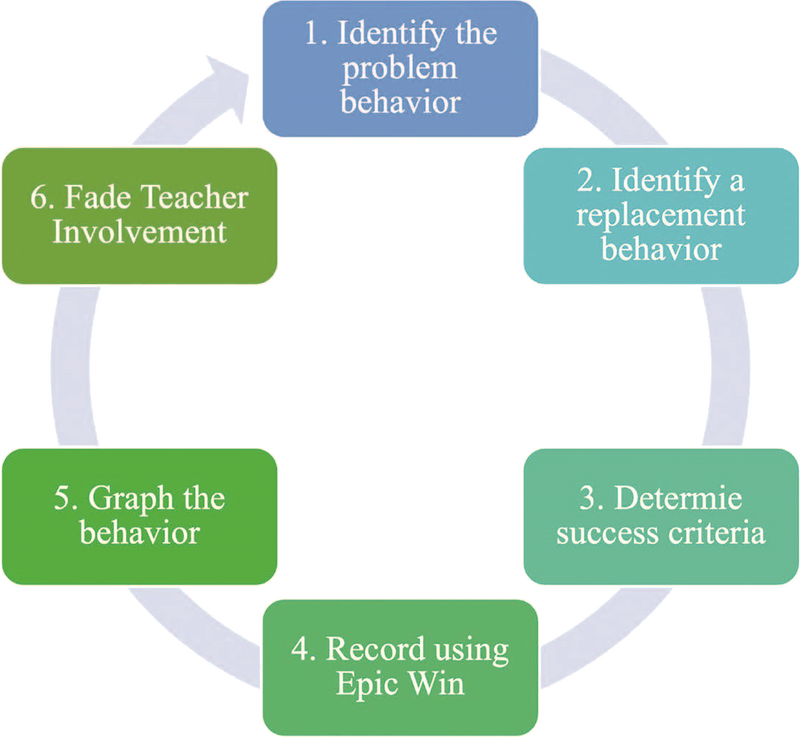
Millie and Ms. Graham next decided that Millie would maintain attention for five-minute intervals across twenty minutes. They agreed that at the end of twenty minutes if Millie had been on task for three of the five-minute intervals (success criteria), she could write a brief note to her friend about her plans for after school. This would allow Millie to record thoughts that might be interfering with her attention.
Next, Ms. Graham explicitly taught Millie to document when she was on-task using EpicWin. Specifically, she modeled “on-task” behavior and they practiced together, noting when Millie was and was not on task. Once the two were in agreement that Millie understood what was expected, she downloaded EpicWin on her cell phone and completed the following steps (see Figure 2). She selected “Princess” as her avatar and then entered “on-task” five times as the “quests” to complete. When Ms. Graham gave the directive to begin independent work, Millie set the Epic Win interval for five minutes to vibrate at the end of the time. When the timer vibrated, she either selected the button that she was on task for five minutes or she did not, whichever was the case.
For the first week, Ms. Graham prompted Millie to document if she was on-task. At the end of the independent work time, Millie earned “loot” for being on task and leveled up in the game. As she continued each day, her avatar traveled along a path demonstrating success. Furthermore, as EpicWin was on Millie’s cell phone, she was able to play the game at home while she was completing homework. EpicWin was very motivating for Millie and within two weeks, she was on level xx and had earned a great deal of loot and gold. Most importantly, Millie submitted all of her classwork and homework and her grades were increasingly rapidly.
Figure 2
Epic Win Game-Based Self-Management
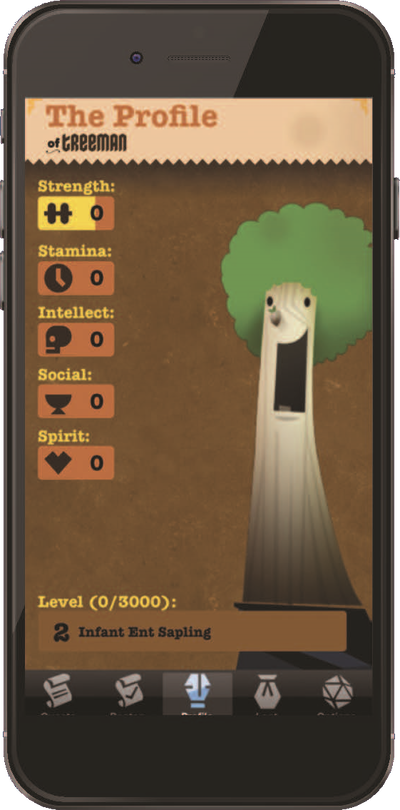 Select Avatar
Select AvatarSeveral avatars are available on the game for students to select and individualize, including Warrior, Skelly, Tree Man, or Princess for motivation. The avatar “grows” as quests are won.
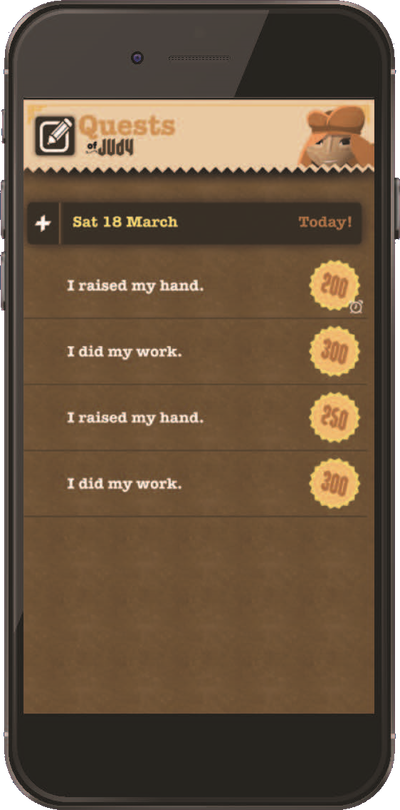 Assign Quests
Assign QuestsThe replacement or target behavior (e.g., stay on task; raise hand) is selected and entered as a quest to be achieved. An interval is selected. When the interval is complete, if the student achieves the quest, he/she select the rosette, which then explodes.
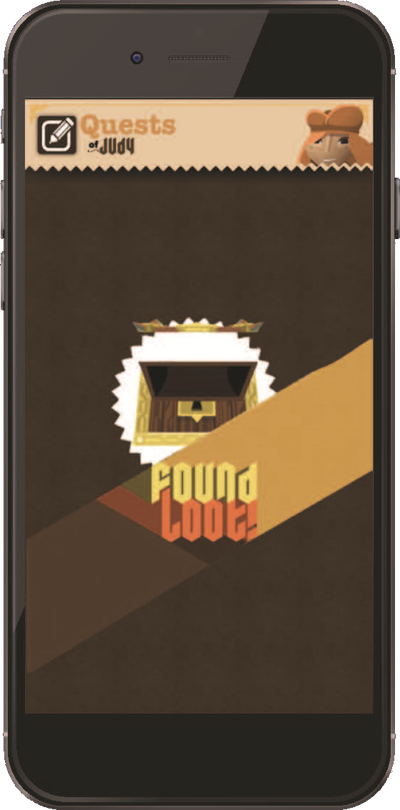 Earn Loot
Earn LootStudents earn loot by completing a quest. Loot earned is awarded intermittently and is often a surprise to the student. Loot is connected with the level the student reaches.
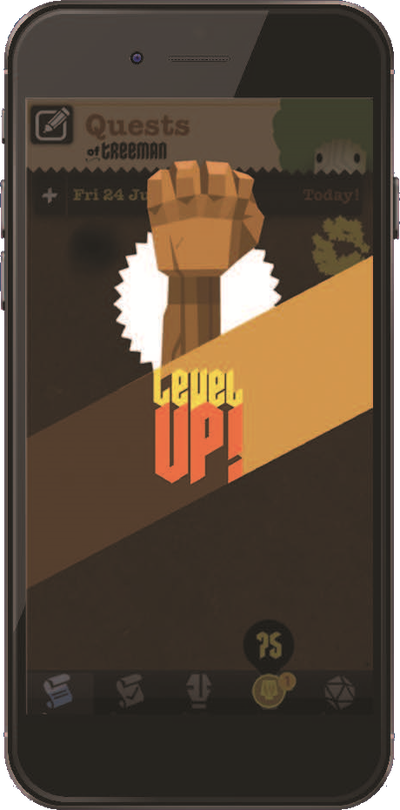 Level Up
Level UpStudent’s level up by competing quests. As students level up, the student gains experience points. With experience points, the avatar and loot earned become more “epic”.
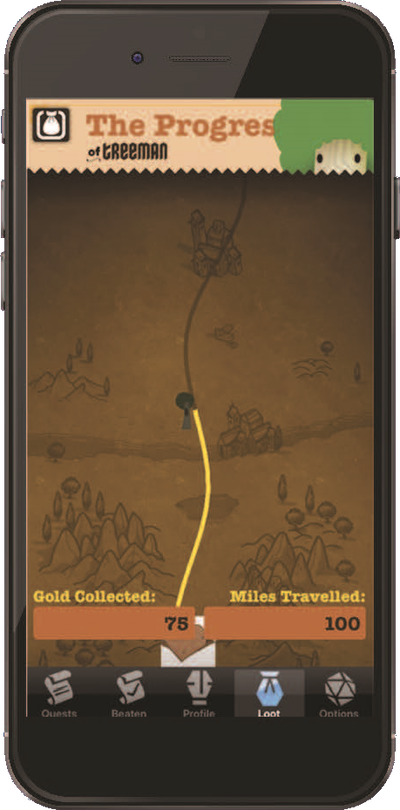 Progress Along Map
Progress Along MapStudents travel along the path in the map by completing quests increasing the motivation to complete tasks.
FOR STUDENTS LIKE MILLIE, it is important that teachers and parents take time to teach the skills needed to independently manage behavior. By teaching Millie ways to independently monitor and improve her behaviors, instead of removing the expectation for her to complete tasks on time by giving her extended time, she will be more successful in other environments, such as college classes or employment settings. Maintaining attention to task and time management are skills needed across a lifetime.
 Judith R. Harrison, PhD, is an associate professor of educational psychology and special education programs co-coordinator at Rutgers, The State University of New Jersey. Dr. Harrison was a special education teacher and counselor for more than twenty years in public schools. Her research focuses on the development and effectiveness of interventions and accommodations for youth with emotional and behavioral disorders, including those with ADHD .
Judith R. Harrison, PhD, is an associate professor of educational psychology and special education programs co-coordinator at Rutgers, The State University of New Jersey. Dr. Harrison was a special education teacher and counselor for more than twenty years in public schools. Her research focuses on the development and effectiveness of interventions and accommodations for youth with emotional and behavioral disorders, including those with ADHD .
 Denise A. Soares, PhD, is an assistant dean, director of graduate studies, and associate professor of special education at the University of Mississippi. Dr. Soares served as a classroom teacher and administrator for eighteen years, as well as a consultant for public schools and parents. Her research focuses on applied and practical experiences in academic and behavior interventions for at-risk students, as well as examining the efficacy of those interventions in classroom settings where teachers have competing time demands.
Denise A. Soares, PhD, is an assistant dean, director of graduate studies, and associate professor of special education at the University of Mississippi. Dr. Soares served as a classroom teacher and administrator for eighteen years, as well as a consultant for public schools and parents. Her research focuses on applied and practical experiences in academic and behavior interventions for at-risk students, as well as examining the efficacy of those interventions in classroom settings where teachers have competing time demands.
 Mindy C Waldrop is a doctoral candidate and graduate instructor in special education at the University of Mississippi. Her research interests are in empathy and cognitive neuroscience. She earned a MS in counseling psychology (The University of Southern Mississippi) and a MEd in education leadership (Mississippi College). She has worked in traditional and nontraditional classrooms as a special education teacher and behavior specialist. She is also in her second term as the university student director of the Mid-South Educational Research Association.
Mindy C Waldrop is a doctoral candidate and graduate instructor in special education at the University of Mississippi. Her research interests are in empathy and cognitive neuroscience. She earned a MS in counseling psychology (The University of Southern Mississippi) and a MEd in education leadership (Mississippi College). She has worked in traditional and nontraditional classrooms as a special education teacher and behavior specialist. She is also in her second term as the university student director of the Mid-South Educational Research Association.
Other Articles in this Edition
The Challenge of Keeping Friends
Is ADHD Related to Eating Difficulties?
Cognitive Disengagement Syndrome
EpicWin as Game-Based Self-Management
Why Are Black Preschoolers with ADHD Expelled?
Launching Successful Young Adults with ADHD
Beware These Sneaky Energy Vampires
How I Manage My Improv-Based Training Business with ADHD
